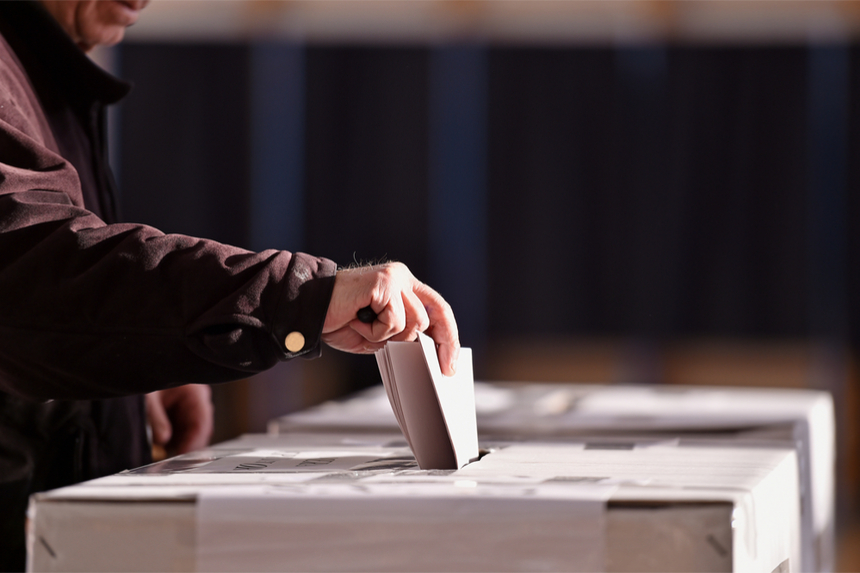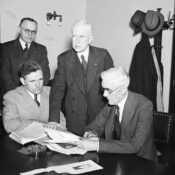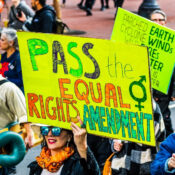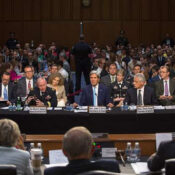One of the basic tenets of American government is that all qualified citizens should be able to vote. We trust the American people to make the right choice.
But Americans’ faith in “the people” has been weakened in the past few years. A great division has yawned between the political parties, and it’s not uncommon to hear Americans claim that voters in the other party are just plain ignorant.
There’s no doubt that democratic elections are determined, to a degree, by ill- or uninformed voters — even though our public education system was created to avoid this. A recent poll showed most Americans don’t know basic facts about the Constitution. (A third of respondents couldn’t name a single branch of government or a single right protected by the Bill of Rights.) Even worse, people may be voting based on intentional disinformation.
In our earliest days, Americans limited the vote to a select minority of people deemed as “qualified.” The colonies only allowed men to vote who owned sufficient property and/or belonged to the correct church. After independence, the framers of the Constitution said nothing about who could vote; they left the question up to each state.
All of the new states kept some form of the old colonial restrictions. In New Hampshire, for example, only white males with £50 of personal property could vote. Virginian voters needed 50 acres of vacant land, 25 of cultivated land, and a house measuring 12×12 feet.
These restrictions were intended to create an electorate of presumably educated, responsible men. But the idea clashed with the principle of equality and, in time, voting restrictions eased. But many people were still prevented from voting.
In 1855, Connecticut became the first state to require voters to pass a literacy test. In 1921, New York required new voters to take a test proving they had the equivalent of an eighth-grade education. (About 15 percent flunked.) As late as 1959, the Supreme Court was ruling that such tests didn’t violate the Fourteenth or Fifteenth Amendments.
The problem with literacy tests was that they could be used for political ends. They were used largely to keep African Americans and recent immigrants from voting. At the turn of the century in Mississippi, 60 percent of Black men couldn’t read. But the county clerk was the sole judge of who was literate, and therefore nearly 100 percent of Black voters were denied the right to vote.
Literacy tests persisted until the 1965 Voting Rights Act prohibited the tests in states that had obviously discriminated against Black voters. Not until 1975 were literacy tests finally banned outright by Congress.
Now, almost everyone can vote, but how well-informed is the electorate? Over the years, surveys have tracked the surprisingly low level of voter knowledge. A 2010 survey found a third of respondents couldn’t tell if the Civil War came before or after the War of Independence. And today, one in five adults say they get most of their political news from social media, which often carries deliberate misinformation from domestic or foreign sources.
The chronic need for better educated voters causes an inherent problem in democracies, according to Jennifer Hochschild, professor of government at Harvard. In 2010, she noted all democracies believe informed voters are essential to good government while they continually extend suffrage to greater proportions of their people. But this tends to bring less informed voters into the electorate, which led to her ask, “If democracies need informed voters, how can they thrive while expanding enfranchisement?”
Recently the idea of an epistocracy — government by the knowledgeable — has been making a resurgence. In his book, Against Democracy, Georgetown philosophy professor Jason Brennan justifies the idea by arguing the public has a right to be protected from individuals’ stupid mistakes.
He compares electoral votes to jury votes. If jurors pay no attention during a trial, or assign guilt based on their first impressions, or develop crazy conspiracy theories about the case, or are simply prejudiced against the accused, they’re incapable of rendering an informed verdict. The judge would have the right to declare a mistrial. The same standard should apply to choosing the president.
Brennan says incompetent voters should not exercise power of fellow citizens. If politicians or voters can’t fulfill their civic obligation morally and effectively, they should be barred from office or the voting booth.
His solution would be to test the political knowledge of all voters. Those votes of anyone who passed the test would be counted as two or more votes. Brennan’s test would be drawn up by 500 randomly selected citizens.
Americans might not appreciate people with a better-than-average-knowledge of government having a louder voice in an election. Citizens who’ve enjoyed a privileged life and the benefit of a good education would outweigh the will of the disadvantaged. And voters who don’t pass the test would naturally assume the test-passers were throwing their weight behind the laws and politicians who would benefit themselves.
Fortunately, democracy — even with its ignorant voters — works better than expected. Economist Amartya Sen points out that democracies have the most stable form of government and never have famines. Other researchers have found democracies generally work to avoid conflict and are less likely to wage war with other democracies. They have less civil conflict, less terrorism, and fewer attacks against women.
And, according to Professor Hochschild, voters aren’t as ignorant as they’re presented. They may not know the workings of legislation, but they are knowledgeable on issues that are important to them. In considering an incumbent presidential candidate, they can always ask themselves if they are better or worse off than four years earlier. Experience can fill in gaps in education; voters learn election by election.
Most importantly, unequal representation is contrary to the very foundations of American democracy. As John R. Allen of the Brookings Institution put it, “The United States is grounded upon the idea that individuals are owed the equal opportunity to voice their opinion as we, through our elected officials, chart the course of our nation. This idea is foundational to our American values and informs a great deal about what it means to be a citizen of the United States.”
Democracy isn’t easy; it requires more attention and thought than many are ready to give it. President Kennedy believed voters should be far better informed, since, as he said, “the ignorance of one voter in a democracy impairs the security of all.”
But Winston Churchill was willing to accept democracy, and voters, as they were. After all, he said, “democracy is the worst form of government, except for all those other forms that have been tried.”
Featured image: roibu / Shutterstock
Become a Saturday Evening Post member and enjoy unlimited access. Subscribe now




Comments
Uninformed people should be able to vote if they are Democrats
Democrats win ALL legitimate elections
Ver informative, a great read.
Perhaps the founders thought of this when originally only land owners (i.e. folks with skin in the game) could vote? However, if the media doesn’t ask one candidate any tough questions and does not allow in discussion about his cognitive decline (despite the fact that it was openly discussed before he became the candidate) can we ever have informed voters.